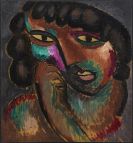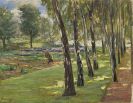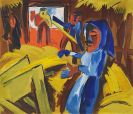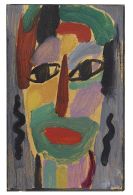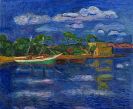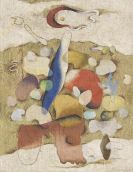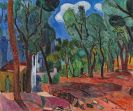
Rudolf Belling
Berlin
1886 -
Krailling
1972
Rudolf Belling was born in Berlin in 1886. After an apprenticeship as a businessman, Belling trained as a modeller for small sculptures and arts and crafts at the "Fortbildungs- und Handwerkerschule" in Berlin between 1905 and 1907. In 1911 he decided to lend an academic base to his autodidactically continued studies as a sculptor and was admitted to study under Professor Peter Breuer at the Berlin art academy without preliminary studies. Alongside Mies van der Rohe, Max Pechstein and Cesar Klein, Rudolf Belling was one of the founders of the artists' association "Novembergruppe" in Berlin, whose chairman he was until 1932.
In 1919 Belling produced his famous sculpture "Dreiklang"', the first non-figurative abstract sculpture in the German-speaking world. Following the abstract and constructivist pieces of his early works, a series of important plastic pictures appeared between 1926 and 1932, including the caricuture-like portrait of the famous art dealer Alfred Flechtheim (1927) and the portrait of German foreign minister Gustav Stresemann (1932).
In 1931 Rudolf Belling became a member of the "Preussische Akademie der Künste" in Berlin. In 1935 on the occasion of his first solo exhibition Belling was invited to New York and given the opportunity to teach at a private art school.
In 1936 Belling returned to Berlin, but the political situation forced him to leave his home country again. When the Nazi's denounced his work as "degenerate", Belling was forced to leave the "Preussische Akademie der Künste".
Many of his works were melted down and many drafts and original models were lost. In 1937 Rudolf Belling accepted the offer of the Turkish government to work as a professor and head of the department of sculpting at the Istanbul art academy. He turned to a naturalistic-classic style of work, but also continued to create purely abstract work.
Against his hopes, he was at first not able to return to Berlin after 1945. In 1955 Belling received the "Großes Bundesverdienstkreuz", followed by the "Berliner Kunstpreis" in 1961.
At the age of eighty he returned to Germany in 1966, where he lived in Krailling near Munich. In the last year before his death, Belling created the bronze "Blütenmotiv als Friedenssymbol" for the Olympic grounds in Munich.
Even though it was not erected, it became the international landmark of the 1972 Olympic Games.
Would you like to sell a work by Rudolf Belling?
Infos for seller
